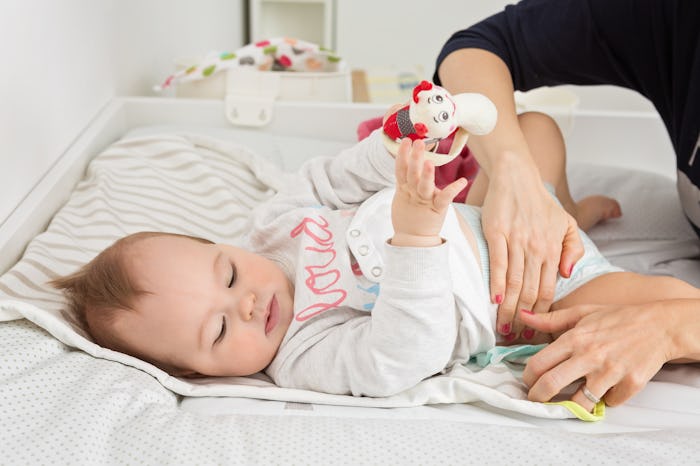As you no doubt figured out pretty soon after giving birth, babies don't exactly poop like the rest of us. That's especially true at first, during the bizarre black-tar meconium phase of newborn elimination, but it continues to be the case throughout infancy — and it's not always consistent, either. So when you see your little one appearing to strain and push, or notice a drop in overall number of dirty diapers per day, you might worry about what you can do to get things moving. There are some things you should never do to make a baby poop, experts say, or at least almost never.
With all the changes in your baby's digestive habits, it can honestly be tricky to figure out if there's even a problem. Even when the only thing your baby is consuming is breastmilk, you may still find confusing variations to his poo: Sometimes it's yellow, sometimes it's green. Sometimes it's runny, sometimes it's lumpy. Sometimes it looks like it has seeds in it (??). And all of those things can be normal! The same goes for frequency: Sometimes babies poop multiple times a day, sometimes they go once a day, sometimes they go for days without moving their bowels at all. And all of those things can be normal, too!
But if, for whatever reason, you're concerned that your little one is having constipation issues, and you're tempted to help the process along, there are some methods experts say you should probably stay away from — as well as some common misconceptions parents have about how and when their baby should be pooping in the first place.
1Rectal Stimulation
Occasionally, a pediatrician (or well-meaning grandma) will suggest rectal stimulation (usually using the tip of a thermometer dipped in petroleum jelly), which can trigger a reflex that makes babies go. It works, but that's not necessarily a good thing, as Bryan Vartabedian, MD, a pediatric gastroenterologist at Texas Children's Hospital and author of Looking Out for Number Two: A Slightly Irreverent Guide to Poo, Gas, and Other Things That Come Out of Your Baby tells Romper.
"Rectal stimulation is okay every now and then, but it’s a bad long-term play," he says.
"When a baby poos, they relax their bottom and push to make a poo. It’s primitive and simple, but it's the sequence we all use to eliminate. The problem is that when you ‘tickle’ a baby’s bottom with, say, a thermometer, their anus relaxes and opens. Babies can get used to this and, if done enough, it can create more problems. In fact, I have treated some babies who have come to depend on rectal stimulation in order to go."
In other words, you don't want to create a situation where your baby can't go without some sort of stimulation aid.
2Misinterpret Normal Signals
As anyone who's ever watched their little one turn bright red as he loudly filled his diaper knows, sometimes it can seem like babies are putting an awful lot of effort into pooping — but that doesn't necessarily mean they're constipated.
In Looking Out for Number Two, Vartabedian calls this "grunting baby syndrome ... a common condition where babies push and work to eliminate ultimately creating a nice soft poo."
This is just a phase, he explains, not a sign that you need to intervene.
"Babies go through a period of learning to relax and push. We need to let babies learn how to do that," he says.
3Use Stimulant Laxatives
Occasionally, the use of a glycerin suppository might be recommended for a baby suffering from true constipation — but more extreme measures (like stimulant laxatives, enemas and mineral oil) should be avoided, as Dr. Jay Hoecker, an emeritus member of the Department of Pediatric and Adolescent Medicine, explains on Mayo Clinic. And always check with your pediatrician before trying a suppository!
4Put Fiber Over Fluid
If your little one is already eating solids, you might think that upping her fiber intake is the way to go. But, as Dr. Vartabedian states in his book, "fiber without fluid makes cement. And while fiber is important, fluid will get you further."
So making sure your child stays hydrated is really the key, and how you do that will depend on her age. Babies who haven't started eating solid foods yet should get all the fluids they need from breast milk or formula, according to the American Academy of Pediatrics; water can be added after 6 months and juice is generally not recommended until after the age of 12 months, though the AAP also says that "after the first month of life, if you think your baby is constipated, you can try giving him or her a little apple or pear juice. The sugars in these fruit juices aren’t digested very well, so they draw fluid into the intestines and help loosen stool."
5Assume Your Baby Isn't Pooping Enough
Parents obsess over everything, but whether or not your baby is pooping enough isn't something you usually need to stress over.
"Parents are often preoccupied with poo counts," says Dr. Vartabedian.
"It’s important to realize that after 1-2 months of age, poo frequency drops from nearly every feed to once ever day or every other day. Some breastfed babies will sometimes comfortably go a week between turds."
Of course you should always check with your doctor if you suspect something might be up, but make sure there really is a problem before you start to think about how you'll treat it.
Check out Romper's new video series, Bearing The Motherlode, where disagreeing parents from different sides of an issue sit down with a mediator and talk about how to support (and not judge) each other’s parenting perspectives. New episodes air Mondays on Facebook.
